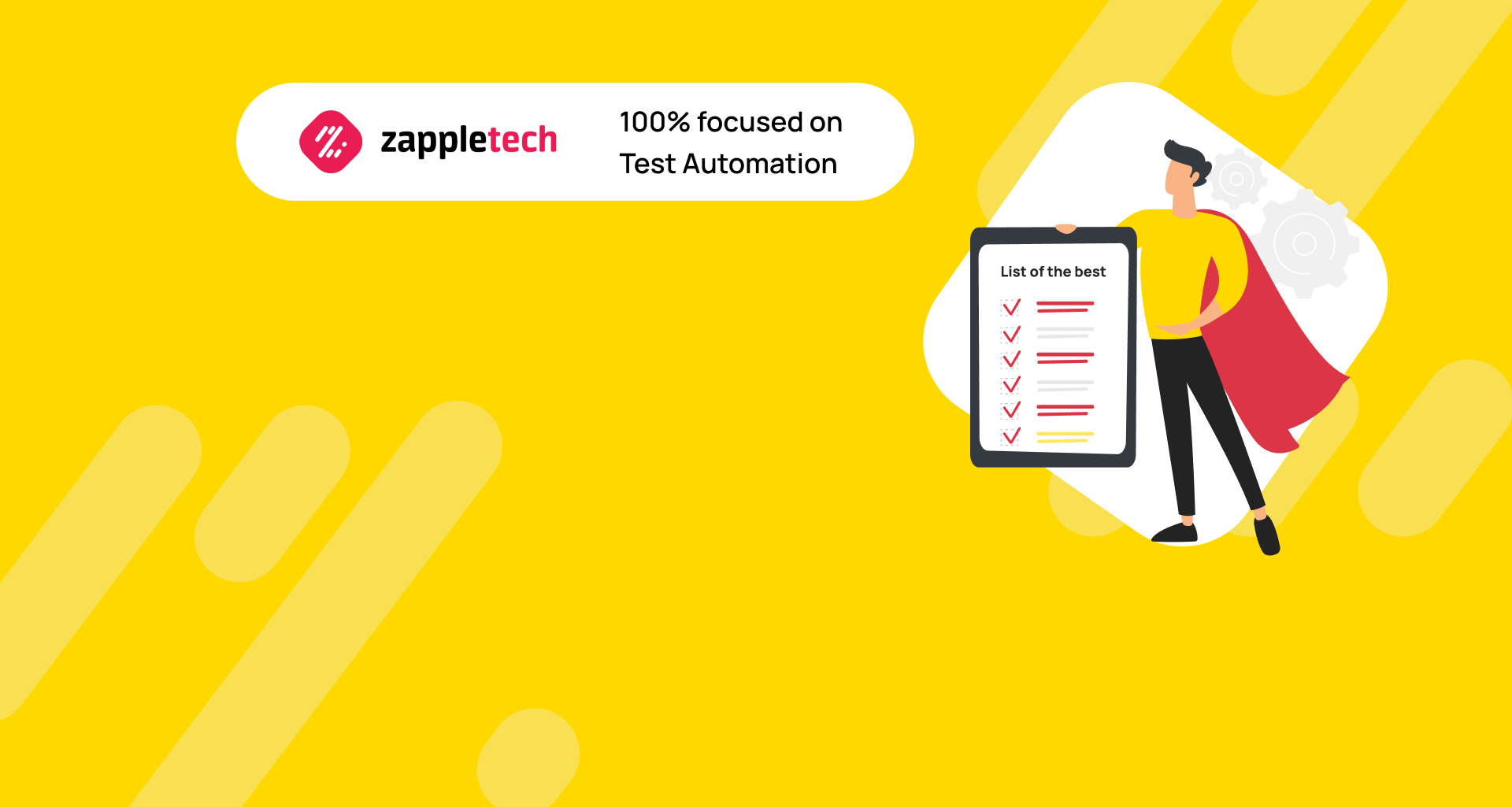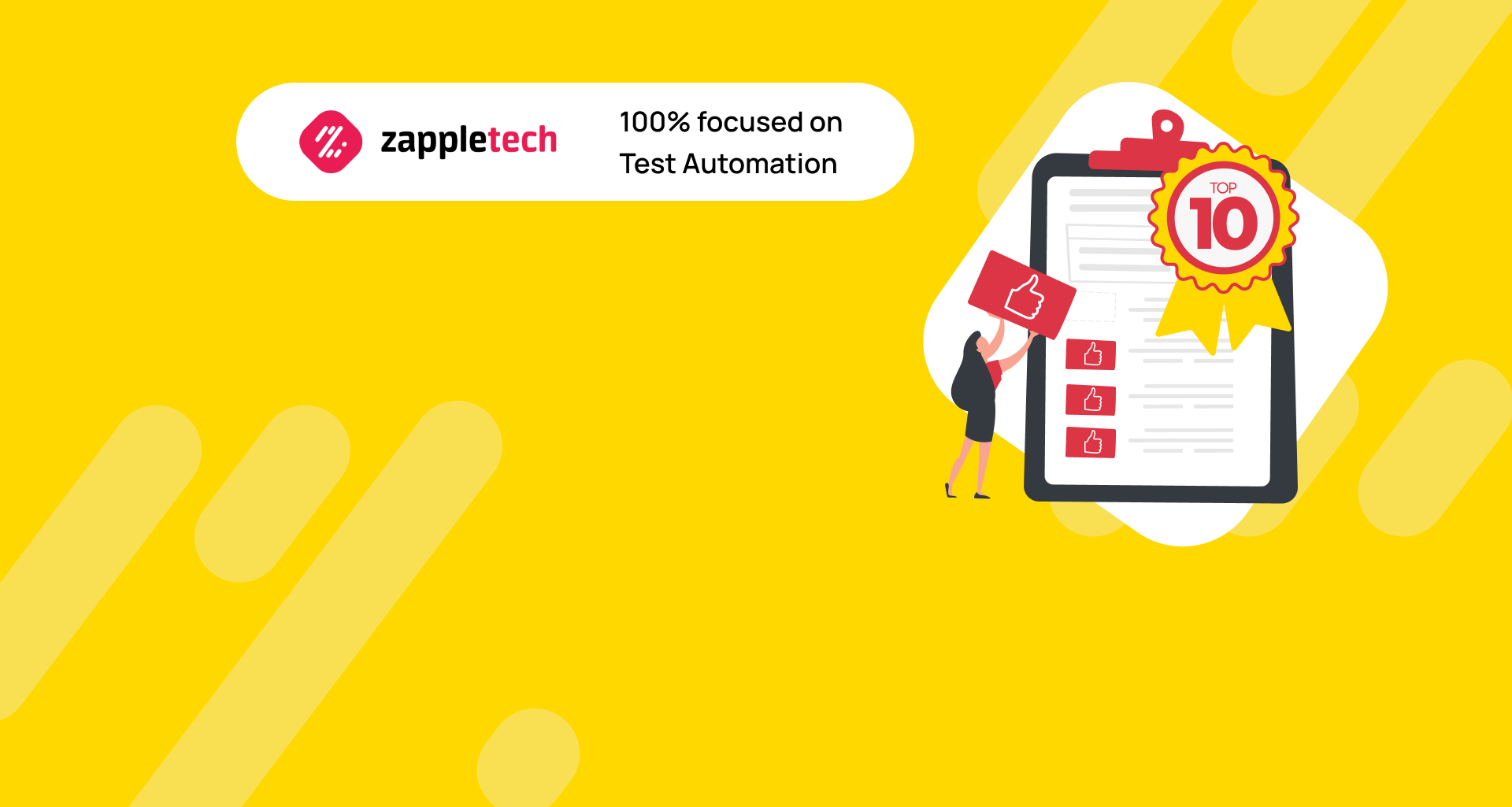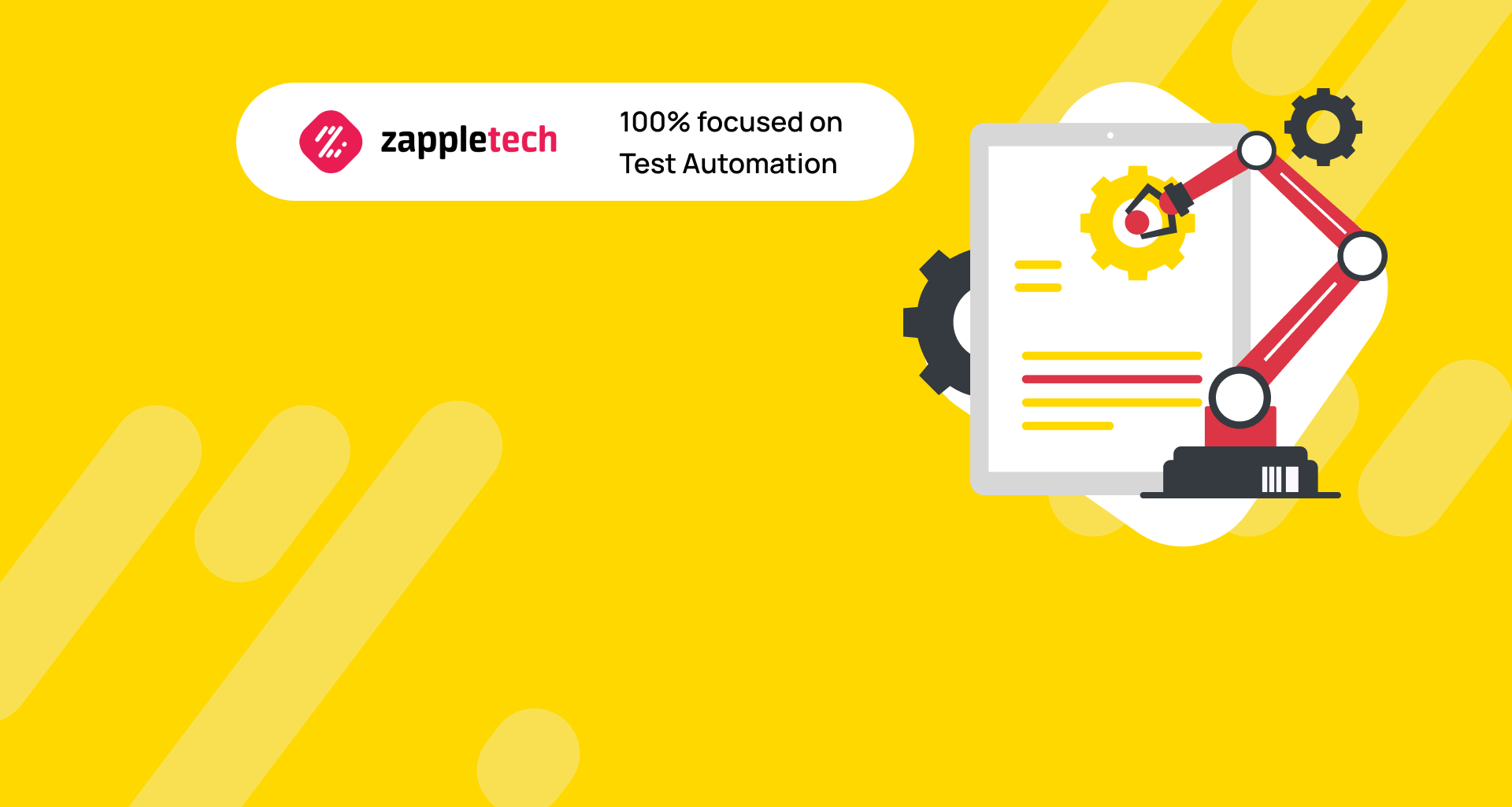Creating and optimizing IT solutions comes with a number of challenges, particularly when it comes to coding, testing, and final polishing. One of the most critical stages in this process is testing, where the application or website is thoroughly examined for errors, glitches, and inconsistencies. This is considered one of the most difficult yet essential operations. The quality of the final product directly depends on the thoroughness of these tests and the diligence of QA specialists.
In recent years, the importance of testing has grown exponentially due to the rise in the test automation market, which, according to GMInsight, is seeing a CAGR of 16%. This market is projected to reach a total value of $60 billion by 2027, highlighting the demand for more efficient and reliable testing solutions.
Choose tools that seamlessly integrate with your tech stack, programming languages, and CI/CD pipelines to ensure smooth test automation without workflow disruptions.Mykhailo PoliarushCEO, ZappleTech Inc.
The most fundamental form of the bug-finding process is unit testing. It sets the foundation for other testing methods by identifying small, isolated errors in individual units of code. Optimizing unit testing tools and automated unit testing tools is crucial for improving the effectiveness of this process, making it faster and more accurate.
To dive deeper into the intricacies of unit testing and its optimization, we consulted with experts from Zapple Tech. They shed light on the nuances of their testing workflows and shared insights into the best tools for unit testing, providing a roadmap for developers seeking to enhance the quality of their software through effective testing practices.
Table of Contents
A Little About Frameworks: What Is It and Why?
These are tools for unit testing and all other types of bug searches. They differ in:
- Purpose, e.g., to check elements of mobile apps, web resources, systems, etc.
- Architecture, because each type of software works according to its algorithm on different platforms (C#, JavaScript).
- Requirements depend on the complexity, flexibility, functionality, and script development language.
- Difficulties in mastering due to the use of proprietary algorithms in scripting.
- Distribution models, because there are both free solutions and complex ones with subscriptions or a one-time purchase.
Various solutions are designed for certain types of testing, technologies, or techniques. They can replace or complete each other, but they are usually used in combination. To understand how frameworks help build test automation, here’s a brief digression into a primary type of bug-finding, specifically unit testing.
Unit Testing: Goals, Challenges, Benefits
Unit testing serves a crucial role in the software development process by ensuring that each individual component or “unit” of code performs as expected. A unit test consists of a set of automated actions designed to evaluate a specific value, class, group, or parameter within the code of an IT solution. Unit testing falls under the white box testing method, where the internal structure of the application is known, and the goal is to verify that a particular fragment of code functions correctly before it is integrated into the larger system.
Goals of unit testing
The primary goal of unit testing is to catch and resolve errors early in the development cycle. By focusing on isolated pieces of code, developers can debug each block more effectively. This process helps ensure that when the individual units are later integrated, they function harmoniously. Unit testing tools, particularly automated unit testing tools, streamline this process by allowing developers to test code repeatedly as it evolves, reducing the chances of introducing bugs during future development stages.
Challenges of unit testing
Despite its benefits, unit testing does present some challenges. Writing unit tests requires additional development time and resources, which can be difficult to justify in fast-paced environments. Another challenge is maintaining these tests as the codebase changes. As features are added or modified, corresponding unit tests need to be updated to reflect these changes. Furthermore, while unit testing tools are powerful, they are not foolproof. Automated unit testing tools can only test what they are programmed to check, meaning issues in more complex interactions between modules may still go undetected.
Benefits of unit testing
The benefits of unit testing far outweigh the challenges. One of the key advantages is the ability to catch bugs early, saving time and resources in the long run. Unit testing also improves code quality, as each unit is verified to function correctly before integration. With the use of modern automated unit testing tools, this process can be expedited, allowing for more frequent and thorough testing without excessive manual effort. These tools can run hundreds of tests in seconds, ensuring that the code is both functional and optimized as changes are made.
In addition, well-implemented unit tests act as a form of documentation, providing insight into how the code is expected to behave. This is especially useful for teams working on large-scale projects, as it makes onboarding new developers easier and streamlines collaboration.
Why Is It So Important to Test IT Solutions With the Right Tools?
Testing IT solutions with the right tools is crucial for delivering a reliable and high-quality product. One key aspect of quality assurance (QA) is selecting the appropriate unit testing tools and automated unit testing tools, which are indispensable for ensuring that individual components of a system function correctly. By integrating these tools into the early stages of development, teams can identify and fix bugs before they become costly issues later in the process.
The significance of unit testing tools lies in their ability to validate the smallest units of code, like functions or methods, in isolation. This ensures that each component behaves as expected. Automated unit testing tools, on the other hand, take this a step further by continuously running these tests throughout development, providing real-time feedback to developers and making it easier to maintain code quality over time.
Modern QA practices emphasize automation to streamline testing processes. The right automated unit testing tools help reduce manual effort, speed up testing cycles, and allow for continuous integration. Tools like Selenium, Appium, and Cucumber are commonly used, but when it comes to testing specific units of code, more specialized tools, such as Jest, NUnit, and JUnit, are preferred for their ability to handle particular programming languages and environments efficiently.
In conclusion, choosing the right unit testing and automated unit testing tools is essential to ensuring the integrity of IT solutions. They allow developers to catch issues early, reduce costs, and ultimately deliver a more reliable and robust product.
Top Six Solutions for Running Test Cases
For more accurate and understandable testing, it is recommended to use special tools that will cope with the tasks and save the time required to run all the scripts and scenarios. Since there are a lot of such solutions, we will limit ourselves exclusively to utilities for automating unit testing.
Unittest
This module is part of the Python programming environment’s standard library. Its key features include flexibility and speed of deployment, making it a popular choice for developers. Unittest is particularly beneficial when working with unit testing tools, as it provides a robust framework that supports the automation of test cases. The native Python environment allows you to fully customize the test script and make adjustments on the fly. Additionally, because the application code and the test script are written in the same language, there is no need for additional knowledge to use this module effectively.
For developers looking to implement automated unit testing tools, Unittest is an ideal choice due to its seamless integration with Python projects, ensuring that tests run smoothly with minimal setup time. It supports test discovery, multiple test formats, and detailed reporting, which are essential for effective unit testing.
Key features of Unittest:
- No dependencies on third-party libraries.
- Full compatibility with Python code.
- Free open license.
Unittest makes automated unit testing of apps or web solutions easier.
TestNG
TestNG is a modern and advanced tool for automating unit testing, specifically designed for Java applications. As the spiritual successor of JUnit, TestNG offers a wide range of powerful features that make it one of the most efficient unit testing tools in the market. Its flexibility allows it to be used as a standalone solution or easily integrated with other systems such as Selenium for broader testing capabilities.
Opt for tools that offer comprehensive documentation, community support, and a user-friendly interface, especially if your team is new to test automation.Mikhail BodnarchukCDO, ZappleTech Inc.
One of the reasons TestNG is highly regarded among developers is its support for parallel execution, dependency testing, and data-driven testing. These features are essential for teams looking to optimize their testing processes and improve the efficiency of their software development cycles. By leveraging automated unit testing tools like TestNG, teams can ensure better code quality, faster release cycles, and improved scalability of their applications.
Additionally, TestNG’s extensive documentation and active community support make it a reliable choice for both new and experienced developers.
Key features:
- Commenting support.
- Data-driven testing.
- Plugin and JDK integration.
TestNG is a modern, flexible unit testing solution. Its toolkit is recognized by QA industry experts, making it one of the best on the market.
Shoulda
Shoulda is a simple yet effective assistant for automating the testing of Ruby-based IT solutions. It simplifies the process of unit testing by offering seamless integration with more advanced unit testing tools like RSpec or MiniTest. One of its key advantages is its user-friendly approach, allowing developers to quickly get started with minimal setup. Shoulda focuses on speeding up the development of test scenarios, making it ideal for those who want to automate their testing without complex configurations.
Additionally, its compatibility with a range of automated unit testing tools ensures that developers can create reliable and efficient tests for their applications with ease.
Features:
- Easy integration with RSpec and MiniTest
- Minimal setup for faster test development
- Time-saving automation capabilities
- Supports a wide range of Ruby projects
NUnit
NUnit is a unique and flexible unit testing tool widely used for applications developed in C#. This tool integrates seamlessly with powerful frameworks like .NET Core, Silverlight, and Xamarin, making it highly versatile for different development environments. It supports multi-threaded parallel testing, allowing developers to run tests concurrently, which speeds up the testing process. Additionally, NUnit is well-suited for creating complex checks, making it a preferred choice among developers looking for robust automated unit testing tools. Its flexibility and compatibility ensure that developers can perform thorough tests efficiently.
Key features:
- Run from a console or VS shell.
- Support for data-driven tests.
- Integration into the main C# testing tools.
NUnit is a leader in its class and is recognized by the global community of QA experts as one of the most reliable and flexible tools.
PHPUnit
PHPUnit is one of the most widely-used automated unit testing tools, designed to streamline the testing process for developers. By integrating seamlessly with Selenium, this module allows for comprehensive testing automation. It’s highly effective in testing key features and components of the software during the development phase, ensuring that bugs are identified early and don’t make their way into later stages of the code.
With PHPUnit, unit testing tools can be leveraged to verify the performance and behavior of individual units of code, significantly enhancing the quality of the final product. Developers and advanced QA experts can rely on this tool to automate their unit testing efforts, reducing the risk of errors and maintaining a high level of code integrity.
Main features:
- Support for JSON, DOM.
- Test parallelization.
- PHP syntax.
PHPUnit is one of the most popular tools in the arsenal of QA professionals.
Jest
Jest is a unique tool designed specifically to work with apps and solutions based on React, JavaScript, and their derivatives. It is highly efficient for unit testing tools, especially when it comes to testing interfaces, which are often challenging and time-consuming to validate manually. Jest’s features make it an ideal choice for automated unit testing tools, simplifying the process of identifying and fixing issues in UI components. Its ability to handle complex UI scenarios ensures faster and more reliable testing workflows, making it an indispensable tool for developers working on interface-heavy applications.
Key features:
- Integration with various testing complexes.
- Easy-to-use syntax.
- Flexibility and variability in scripting.
Jest is one of the best players in the QA market in its class, appreciated by thousands of industry experts worldwide.
Summarizing
Unit testing automation is a vital process in software development that involves the verification of individual components or units of code to ensure they function as intended. This process can be both intricate and time-consuming, requiring a deep understanding of the system’s architecture, the ability to write precise test cases, and the skills to automate those tests for efficiency. While modern unit testing tools can significantly ease this process, the full benefit of these tools is only realized in the hands of experienced QA engineers.
At Zapple Tech, we specialize in using the most advanced automated unit testing tools to streamline and improve the testing process for a wide range of software products, regardless of the tech stack or programming language involved. Our team of experts understands that unit testing is not a one-size-fits-all task; each project requires a tailored approach to ensure optimal results. By leveraging industry-leading frameworks and tools, we ensure that every unit of code is thoroughly tested and any issues are caught early in the development cycle. This proactive approach reduces the risk of bugs making their way into production, saving time and resources for our clients.
Furthermore, our expertise extends beyond just testing individual units. We integrate automated unit testing tools into CI/CD (Continuous Integration/Continuous Deployment) pipelines, allowing for real-time feedback and ensuring that each new code deployment is automatically tested for errors. This ensures rapid identification of issues, which is crucial in today’s fast-paced development environments where delays can impact project timelines and product quality.
One of the key advantages of working with Zapple Tech is our commitment to delivering bug-free software on time. We know how important deadlines are in the tech industry, which is why we use cutting-edge unit testing tools to automate the testing process, accelerating the development lifecycle without compromising quality. Our meticulous attention to detail and robust testing methodologies mean that when we say an IT product is ready for deployment, it is as close to bug-free as possible.
Ensure the tool can handle both small projects and large-scale testing environments, allowing room for growth as your testing needs evolve.Sergey AlmyashevCOO, ZappleTech Inc.
Our services are designed to be flexible and adaptable to each client’s specific needs. Whether your development team is working with Java, Python, JavaScript, or any other programming language, we have the tools and expertise to handle the project with precision. We also provide comprehensive test reports and detailed feedback, ensuring complete transparency throughout the testing process.
If you’re looking to enhance the quality of your software while meeting tight deadlines, Zapple Tech is your ideal partner. By incorporating automated unit testing tools, we ensure that your product is thoroughly tested, reliable, and ready for market. Contact our manager today for a consultation or to learn more about how we can collaborate to improve your product’s quality and performance.
Zapple Tech is dedicated to being your trusted partner in delivering top-tier IT solutions, ensuring that every product we test meets the highest standards of quality, performance, and reliability.







